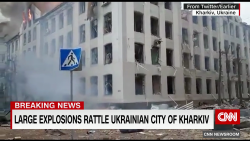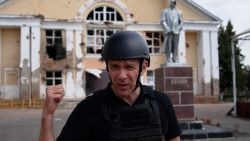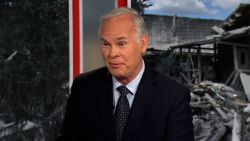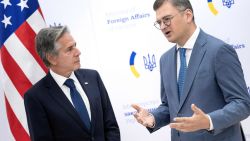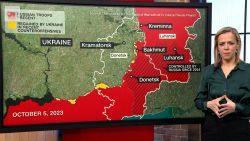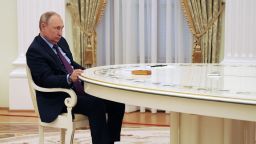Editor’s Note: Marcus Mabry is the Senior Vice President of Content Strategy and Global Programming at CNN Digital Worldwide. He is the former Edward R. Murrow Press Fellow at the Council on Foreign Relations, former president of the Overseas Press Club and the author of “Twice as Good: Condoleezza Rice and Her Path to Power.” The opinions expressed in this commentary are his own. View more opinion at CNN.
The world is aghast at the horror taking place in Ukraine. Urban centers are being attacked. Civilians, including children, are being killed. All of it seemingly because Russian dictator Vladimir Putin decided he could swallow up a neighboring country.
Millions around the world watch, outraged, and ask, “Are we just going to let this happen? Is the world allowing a large, powerful country to swallow up a smaller, weaker one?” And so many people can’t believe the world is allowing it to happen. But we are. And we usually have.
In fact, it has long been considered “sound” foreign policy. One of the central reasons offered by its defenders: Calculating which negative outcomes are undesirable yet not existential for the outside world (Ukraine potentially falling to Russia) and which are worth going to war over (a NATO member being attacked) has kept much worse outcomes from occurring, like World War III.
The practitioners of foreign affairs – the women and men who decide how their nations will interact with the world – know this reality as “realpolitik.” It is the dry-eyed (and some might say coldhearted) practice of global politics as a logical game of means-ends calculations.
Because no country’s power or influence is infinite, nation-states must determine what are their crucial, even existential, interests and what are not. They must also decide what risks they are willing to take to accomplish what goals, and what risks are too great.
If Machiavelli and Otto von Bismarck are often proffered as two fathers of realpolitik, the Cold War is perhaps the greatest endorsement of its wisdom. As the thinking goes: Despite a “twilight struggle” between the superpowers and their many proxy conflicts and close calls, like the Cuban missile crisis, they never allowed confrontation to escalate to a direct conflict, or worse.
They acted “rationally” given the stakes and the circumstances of who had power and interest were on the globe. So the US and its allies let Moscow have its sphere of influence in the Soviet Union, which included Ukraine, and the Eastern Bloc, which included Poland and other countries that after the end of the Cold War joined NATO.
And it “worked,” in that sense. There was no nuclear war. No WW III. No annihilation of humanity. Yes, millions were oppressed by Soviet communism. But realpolitik is not, strictly speaking, concerned with that. It is a world Vladimir Putin and Joe Biden grew up in.
But we have never had to watch realpolitik unfold in real time on 24/7 social media in a world of ubiquitous camera phones. And it complicates matters, especially for world leaders, like Biden and Putin. It makes the cruelty of traditional power politics transparent and ubiquitous.
To put the current state of international affairs in the most terribly brutal realpolitik terms: Is Ukraine worth the possibility of involving the United States and Russia, two nuclear powers that could destroy human life on earth, in a shooting war? And are the risks to their citizens and the world worth keeping Putin out of Ukraine?
These questions do not consider the morality of allowing a smaller country to be swallowed by a larger one, or a democratic one to be crushed by an authoritarian one. But that is the whole point of realpolitik.
Recognizing that considerations not connected to calculations of relative power – like morality or ideology – can lead nation-states into actions that actually threaten their power and even their existence, realpolitik seeks to remove those considerations, or at least to place them in a rational hierarchy.
This is why Joe Biden has repeatedly said the United States will not send troops to Ukraine. This is why the United States actually removed its troops who were engaged in training from Ukraine once it knew Russia was coming.
Some critics have lamented that Biden signaled to Putin that the United States would not intervene directly militarily in Ukraine. He did signal it. And that was the point. To let his adversary know clearly how far he can go, and where the line is.
And the line is NATO. Article 5 of NATO – the central pillar of the trans-Atlantic alliance – says an attack on any member will be treated as an attack on all members.
Ukraine is not a member of NATO. Its neighbors Poland, Slovakia, Hungary and Romania are. If Russia attacks any of them, the United States and the other 29 members of NATO are obligated by Article 5 to consider it an attack on themselves and to defend that member state.
That is a dangerous trip wire. Putin knows this. And Biden and the leaders of NATO are hoping that knowledge will keep Putin from going farther than Ukraine.
Of course, the US and other nations are not sitting idly by and doing nothing.
Sanctions are powerful. They are short of military confrontation, but they can bite. Russia is even suggesting it will treat them as acts of aggression. Moreover, non-state-actors like business, sports, arts and cultural institutions can take actions too. And they are.
Still, the limits of realpolitik are manifest.
Morally, of course. Watching the Russian war of choice imposed on Ukraine is difficult. Watching children die just because Putin decided to invade is terrible.
An even graver shortcoming is successful realpolitik relies on your opponent being rational. There is increasing speculation among some American Putin experts, including Russia expert and former Secretary of State Condoleezza Rice, and the French President that Putin may not be completely rational, and it does appear to be only that, as far as we know, speculation.
Terrorists, such as Al Qaeda or US domestic terrorists, are not rational actors either.
They also are not nation-states, so they have no land you can threaten and relatively few economic interests you can attack. So realpolitik is limited in its ability to help leaders calculate what moves and countermoves will lead to what consequences. And that is the greatest danger of all.


